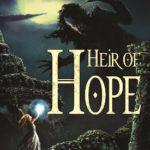Christian Speculative Fiction: Working Within Boundaries
As an author of many speculative fiction novels and as a pastor, there are two seemingly opposing forces struggling within me as I work to come up with new ideas in my writing. First, how to come up with exciting fiction that will keep my readers riveted to my story, furiously flipping pages–or these days tapping the page-over buttons on their Kindles and Nooks–well into the wee hours of the morning. Secondly, as a Christian desiring to walk faithfully before the Lord, how to stay within the framework of truth presented in God’s holy word. Can Christian Speculative authors really compete with the kind of energetic fantasy we find in the secular market without violating truth?
Actually, I think we can and that without invoking the seemingly endless varieties of Amish community stories that seem to be out there. At any rate, I thought the best way to illustrate my point would be to give examples from my own writing while giving my reasoning behind the different plot structures.
 My first novel, The Chronicles of Soone, is a sci-fi fantasy story written in the Star Wars style. It has various races, warriors with supernatural psychokinetic abilities, high tech weaponry galore, space ships galore, and even inter-dimensional travel. However, the one thing blatantly missing in this story is the presence of “alien” life forms of the George Lucas variety. Why? Well, as a Christian, the Bible leaves no room at all for the existence of aliens like these. The Bible easily establishes the existence of a spiritual realm and a mortal realm. However, alien life forms of the “little-green-man persuasion” are given no inclusion in the creative framework of God.
My first novel, The Chronicles of Soone, is a sci-fi fantasy story written in the Star Wars style. It has various races, warriors with supernatural psychokinetic abilities, high tech weaponry galore, space ships galore, and even inter-dimensional travel. However, the one thing blatantly missing in this story is the presence of “alien” life forms of the George Lucas variety. Why? Well, as a Christian, the Bible leaves no room at all for the existence of aliens like these. The Bible easily establishes the existence of a spiritual realm and a mortal realm. However, alien life forms of the “little-green-man persuasion” are given no inclusion in the creative framework of God.
One might ask, how did you come up with different inhabited planets and the various human races you include in this story? I began with this possibility. What if God, in his omnipotence and omnipresence, chose to create a completely different universe apart from our own? He would, very likely, populate it in a similar manner–creating a race in his own image. Being subject to the possibility of sin, they would–as all created beings have–fall into disobedience and the condemnation of it. God would seek to redeem them and so on. Thus I allowed myself some latitude in technology and history, geography and so on, but I’m still working with spiritual enemies and mortal needs from a Creator God. There’s a lot that can be done with it, and the premise of God creating apart from our universe is totally plausible based on who God is … I don’t believe he did, but it is plausible and that’s what speculative fiction is all about, right?
In this type of story, and many others, allegory is very useful–making comparisons between the “other” humans in the “other” world with our own. However, God is always God, no matter what world we are talking about. This is one of our boundaries that must not be crossed. People change–unless you’re talking about our basic nature to do evil–but God does not change. No matter what world we may dream up, God is the same. Otherwise, we are technically not dealing with “Christian Speculative Fiction” anymore, but something with a view of God like the world views him … not as the scripture does. Many great stories have been written in the allegorical style. The Chronicles of Narnia instantly springs to mind, but there is a never ending flow of others.
My second example takes a different route: that of placing Christian characters into fantastic real world situations. We can stay home for this one–we don’t need to build other worlds to explore. We just need a thrilling adventure right here on good ole Earth into which we can place Christian characters and watch how they handle these unique, often overwhelming, circumstances. Hallowed Be Thy Name is based on a Jekyll and Hyde type of plot, only modernized, focusing on genetic research. Trenton Hallowed has developed a genetic mutagen hoping to speed up man’s supposed evolution. Instead, he has strengthened man’s primal ferocity and his mutagen is causing terrible physical changes as well as rendering him a psychotic murderer. Jonathan Hallowed is a believer and a relative to this geneticist. In the process of the story, Jonathan is dosed with the mutagen as well and finds himself strengthened by it, but because his body’s metabolism speeds up out of control, he is also racing toward death.
Jonathan is a Christian character facing fantastic circumstances. The speculative fiction is there, but without the need for allegory. Jonathan has choices to make just like we all do and he makes those choices based upon his faith in Jesus Christ. In this type of setting we can see the thought process we all go through before the watching world. Only the circumstances are amped up to the extreme. God is still God and the scripture stands without being violated.
 My last example takes its plot directly from the pages of scripture. By using unfulfilled prophecy, such as we find in the book of Revelation, we can come up with a lot of interesting plot points even though we are working within a more limited framework–prophecy itself. For example, in my novel, Perdition’s Gate, I chose the Great Tribulation as my setting, but I didn’t want to copy the Left Behind series. Therefore, since the timing is unknown to us, I set tribulation period in 2094. It’s still a seven year tribulation as the Bible teaches, but with an advanced date I had liberty to make up a lot of preceding history and reframe the world during that time, whereas Left Behind used what we know today. I literally had 80 years of time between now and my setting to have all sorts of events taking place, new technologies invented, etc., that I could then use in my story!
My last example takes its plot directly from the pages of scripture. By using unfulfilled prophecy, such as we find in the book of Revelation, we can come up with a lot of interesting plot points even though we are working within a more limited framework–prophecy itself. For example, in my novel, Perdition’s Gate, I chose the Great Tribulation as my setting, but I didn’t want to copy the Left Behind series. Therefore, since the timing is unknown to us, I set tribulation period in 2094. It’s still a seven year tribulation as the Bible teaches, but with an advanced date I had liberty to make up a lot of preceding history and reframe the world during that time, whereas Left Behind used what we know today. I literally had 80 years of time between now and my setting to have all sorts of events taking place, new technologies invented, etc., that I could then use in my story!
Another way that I chose to stay out of Left Behind territory was my hero. The character is actually a special ops agent working unknowingly for Antichrist. Through the course of events, this character is forced to come to terms with the truth about events happening around him, his own lost condition and the prophecies coming to pass in the world. He goes from a lost man to saved, along the way asking the same questions lost people ask and receiving the sound wisdom of scripture in answer.
These examples are merely the tip of the iceberg. There are many ways for Christian authors to work within the framework of our faith in order to tell awesome stories that lost and saved alike can be thrilled by while at the same time offering nuggets of spiritual truth that feed the soul. While the publishing industry has relegated this sub-genre to the corner and limited access, we as writers don’t have to be as limited as we might suppose. And with an ever-widening portal into publishing through the increasingly popular ebook market, the possibilities appear more favorable than ever.
– – – – –
 James Somers‘s writing career began with the sci-fi action novel The Chronicles of Soone: Heir to the King published by Variance Publishing/Breakneck Books. He has since published the sequel, The Chronicles of Soone: Rise of Lucin as well as two new action-thrillers: Perdition’s Gate and Hallowed Be Thy Name. He has several other novels in progress in both the thriller and young adult fantasy genres.
James Somers‘s writing career began with the sci-fi action novel The Chronicles of Soone: Heir to the King published by Variance Publishing/Breakneck Books. He has since published the sequel, The Chronicles of Soone: Rise of Lucin as well as two new action-thrillers: Perdition’s Gate and Hallowed Be Thy Name. He has several other novels in progress in both the thriller and young adult fantasy genres.
In addition to writing, James serves as the pastor of Ozone Baptist Church in Rockwood, Tennessee, and also works in Knoxville as a surgical technologist. He is married and has five children.
He may be reached for interviews or discussion at jamessremos at yahoo dot com









































Hm. I have some Thoughts about this statement:
“Well, as a Christian, the Bible leaves no room at all for the existence of aliens like these. The Bible easily establishes the existence of a spiritual realm and a mortal realm. However, alien life forms of the ‘little-green-man persuasion’ are given no inclusion in the creative framework of God.”
I’m having a hard time figuring out how “not mentioning” translates to “leaves no room at all”. I thought C.S. Lewis did a remarkable job of suggesting how non-human alien life might still exist in a universe created by the God of the Bible in OUT OF THE SILENT PLANET, for instance, and there’s nothing remotely blasphemous or Bible-contradicting about his approach to the subject that I could see.
If God created non-human life on THIS planet – and He certainly did so to the tune of billions of species – then why couldn’t He do so on some other planet? Of course it raises the question of whether *sentient* non-human life on other planets would have undergone the same Fall and redemption as on our own, and I would prefer to avoid the notion of Christ becoming incarnate and dying again and again for sentient sinful beings on other planets (again, Lewis dealt with this issue nicely in OOTSP, I thought). But just because it’s a bit of a vexing problem for the Christian author’s imagination and needs to be handled with reverence and care doesn’t make it flat-out *anti-* scriptural.
Not that I myself have felt the yearning to write about bug-eyed creatures from other planets, or at least not yet. But I have in the past taken advantage of the loophole that the Bible is the revelation of God specifically to fallen humanity – and that there might well be other creatures with whom He interacts who are not addressed in Scripture, but we humans don’t know about that because it’s Somebody Else’s Story.
I knew this would come up, though I wrongly thought I’d be the one to bring it up!
My wife and I were just discussing this. In brief, our conclusion: Scripture doesn’t necessarily rule out plant or even hnau (sentient, communicating) life outside Earth. But, if God did create such life, it’s at present tangential in His main plan (e.g., “He made the stars also,” a “throwaway” line from the Genesis 1 creation account). Such life could not participate in the plan of salvation necessary only for Adam’s race and God’s image-bearers, who alone are responsible for their sinful natures and must be redeemed. Thus, the “other sheep” verse from John 10 still can’t refer to anyone other than Gentiles, based on both Christ’s context and the fact that He planned to save them.
How could that affect other, non-human creatures in the universe, if they existed? That would be excellent material for a boundary-straining, yet not -breaking, novel.
(Of course, Lewis has already done some of this with his Space Trilogy.)
Loved your column, James, and before this I had never heard of you! So glad to rectify this oversight. Perhaps you might clarify more of why you believe Scripture bars sentient alien life in this universe? I’ve been arguing the same — partly why the topic is still hot now — but it hasn’t worked too well, and I’ve a feeling I’ve been using some off-the-shelf generic arguments. Maybe you have some of the name-brand stuff.
But either way, this is something on which true, committed Christians can disagree!
I love how we all jump on the “no alien life”, which might have been only a side issue… to be honest, that was my first reaction too.
And this is why I write fantasy with its own world 🙂 (while remaining true to who God is and His character).
Three comments:
1. Ozone Baptist Church–how cool is that, especially for a pastor moonlighting as a spec-fic writer?
2. I think in the alien life discussion we have to be very clear about what we mean and what the Bible means by the phrase, “created in the image of God.” Good arguments all around on this, but we’re talking about a God who is Spirit, existing in a Trinity of coequal, coeternal Persons, Father, Son, and Holy Ghost, incarnate in Jesus Christ. I can’t fully comprehend this, and thus I hesitate to assert that I fully comprehend what it means to be created in the image of such a Being. Sentience may be a close enough approximation for our purposes (or the possession of a soul, which is harder to assess). Lewis’ hnau seems to mingle these, and it’s a good example of when an English word doesn’t suffice to encompass an idea.
I’m with R.J. in that the argument from silence doesn’t convince me. The universe is simply too big for me to find it credible that nothing happens, has happened, or is happening that we’re not told about. Now, it could be that it takes that much matter and space to make us possible or it could be simply a testimony to the glory and generosity of God that everything in the cosmos is here for us and us alone. However, I don’t think other civilizations, even quite alien civilizations, are necessarily excluded from our universe or somehow diminishing of God’s soverignty or what He’s accomplishing with us. As Lewis said, and R.J. observed, that might just be someone else’s story, and not germaine to ours at the moment. Not greater, not less, just different.
3. Galadriel: It’s not nearly as much fun to talk about the stuff we all agree about. 🙂
Great post, James. Best wishes for continued success in your writing projects.
Fred
Great post, James.
I always love hearing the reasoning behind how people deal with the theological touchpoints behind their world creation. It can really be a touchy subject that each author has to come to their own conclusions about.
For instance I have no problems with having sentient alien life inhabit our same universe in fiction. I actually would have a bit more of an issue trying to validate why all aliens would be human rather than… well alien. I’m also not convinced that being created in God’s image means a being must look like a human.
I also wouldn’t be too afraid to tackle the implications of what might happen if a number of worlds in the universe fell to sin. Would Christ need to pay for their sins in the same manner as he paid for our own, specific to them? If not, what other plan would there be in place?
I think for me, a lot of my own thinking comes down to so much of our Christian thought in America being self-centric… “Christ would have died to save just ME.” Does the universe revolve around the Earth? Is this blue globe the center of everything? Or is there a bigger picture out there we’re just not privy to.
James, I like the way you illustrated the various kinds of speculative fiction. I could understand what you’re saying and I believe wholeheartedly that truth should be the boundary within which we should write. In other words, Jesus would never decide not to go to the cross or Satan would never win in the end, God wouldn’t send a second flood and start over with a new Noah and the Holy Spirit would never turn on the other persons of the Godhead. You get what I’m saying. There are some things that are true and must remain true. In fact, as a Christian I want above all else to show God’s truth in my fiction.
That being said, I, as a fantasy writer, believe that the pretend can show the truth, perhaps better than what is real to our experience. Hence, I have no trouble with aliens of any stripe because I would simply put those in the “pretend” category. They are pretend because we have no evidence, scientific or Biblical, for their existence.
I don’t think that the Bible’s silence is a reason for us to eliminate pretending. If that were so, we couldn’t enjoy any of the great fantasies or most of the lesser ones, either. No elves, dwarfs, dragons, fawns, or talking lions. In the end, we’d be back at the question, Does God allow us to subcreate? I not only think He allows it, I think He put that in Man as part of our being made in His image. As we pretend, we are exercising our “image-bearer” capacity. And this leads back to the series Stephen has been writing.
Becky
We really don’t know what God would do as far as the creation of other worlds. We have no experience of that. For all we know billions of other worlds with countless other lifeforms could already exist. I don’t believe their is anything scriptural against it. We are given what is relevant to us in our world. Why should the Creator of all the diversity known to us xerox the Earth and it’s inhabitants over and over again, and reenact the exact same drama over and over again? Human artists aren’t that unoriginal, human writers are not that predictable- how much more original, mind-boggling, unpredictable, and captivating could another world created by the Ultimate Creator & Source of All Creativity be?
And there are not multiple races of humans on the earth, btw. We are all of Adam’s linage. I do not believe “In His Own Image”means we look like God physically. God is not human (and humans even look greatly different from each other), and is free to create however He wants. If he did create other creatures in his own image they too could share qualities with God that reflect who God IS… and they could look like mice or rabbits, or have 10,000 eyeballs all over their bodies… I am So glad God is not limited by human beliefs about Him. Why would God be limited to creating in His own image anyway?
I’ve been hearing a lot of “thus saith the Word” lately that is pronounced as undeniable facts- but it’s stuff that does not seem presented in that way in the Bible. All you know isn’t all there is, and the Bible does not contain every fact of God and his creation.
consider that God has given from a look at creation in this universe from eternity to eternity and from before death to when death is finally defeated as the last enemy. There are no “real” aliens in this universe…are they somehow delivered from death without redemption and never spoken of? Hmmm…that wouldn’t be scriptural as near as I can tell. Since the bible leaves the new creation free from death and all else spoken for, how could other “intelligent” lifeforms exist in this created universe? Alternate universe created by God…who knows…but this one seems well spoken for in my opinion.
REbecca: now the realm of imagination and man as a creative being in the image of the Creator is a totally different matter. I’ve actually already used that in my “Percival Strange and the Lonely Manor,” novel…Percival finds himself at the gateway between reality and the realm of human imagination at the creepy Lonely Manor. All manner of things man has dreamed up occur there…but they are not given the identity of “real” created beings…and since they come from man’s sinful imagination they are dysfunctional to say the least 😉
Great article, James. There definitely are some ideas that are interesting but not supportive of Christian worldviews or beliefs and should be best avoided. That said, Earth is God’s playground, not Satan’s, so we shouldn’t attribute so much power to the Enemy. There are a myriad of ideas that non-Christians would never consider, so I’d say that we have a fairly level playing field with them. Actually, we have the upperhand (not that it’s a competition). 🙂
As for aliens, I believe aliens are mostly hoaxes, sometimes hallucinations brought on by drugs or copious amounts of alcohol and other times are demonic influence turning people from God’s truth. In ages past, they appeared to people as their pagan gods. Now, in our more cynical, scientific era, they use the same old tricks but mask themselves as aliens. I believe God created Earth as the one place he would show his glory by sustaining life there. I believe there are no such thing as ‘aliens’. But I also believe there is nothing wrong with playing the ‘What If?’ game with the idea that there could be aliens. After all, writers play ‘What If? with concepts and themes all the time. That’s a large part of excercising one’s imagination.
Good examples all, but you’ve managed to tangentially hit a few of my hot-buttons.
As Tolkien says in his introduction to The Lord of the Rings, “I think that many confuse ‘applicability’ with ‘allegory'”. The Chronicles of Narnia aren’t allegories; the only modern true allegory I’m aware of is John White’s Anthropos series, and even that goes outside strict or pure allegory from time to time. An allegory has two stories, the outer and the inner story, going on at once, with everything in the inner story (which is what you’re telling) representing something in the outer story. For a basic understanding of true allegory, I recommend reading at least the second chapter of C. S. Lewis’ The Allegory of Love.
That’s … arguable. I’ll admit that most Christians today accept a futurist interpretation of Revelation and other associated passages, but several if not most early Church Fathers interpreted most of Revelation and the relevant passages in the Gospels, Daniel, etc., as referring to the Jewish War and the destruction of Jerusalem.
Before I became convinced of the partial-preterist and postmillenialist position, I planned to do the same thing as your third example: describe a possible fulfillment of Revelation in the future in the context of my own planned series. (The date I picked was a great deal farther out than yours: around 3000 AD, so as to have the Crucifixion be the center of all history, including the Millennium to follow.) But after my opinion was changed, that still leaves me with an exciting—if not quite as conflict-ridden as the Tribulation—story to tell: the conversion at last of all people (with humanity, in the projections I’m making for the purpose of the story, spread to the stars) and the reunion of the Church.
Thanks for posting this.
The matter of aliens has been dealt with by others more qualified to do so than I, in these comments.
I raise another point, also dealt with by another commenter. Christian scholars are far from unanimous in believing in a seven year tribulation. For one thing, the phrase “seven years” does not occur in Revelation at all, even though “seven” occurs a lot. For another, a Google search for “seven year tribulation” turns up a significant number of pages, apparently by Bible-believing Christians who have studied what the Bible says about the matter rather thoroughly, who are not convinced that the Bible teaches such.